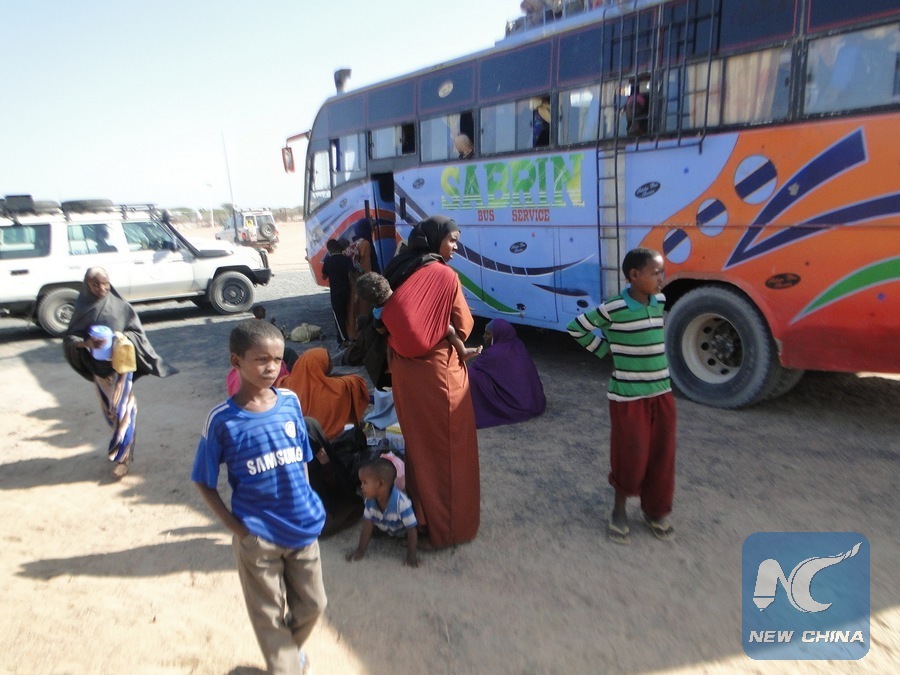
Somali refugees prepare to get on a bus heading for Somalia at Dadaab in Garissa, Kenya, July 1, 2016. The Kenyan government on Friday kicked off voluntary repatriation of Somali refugees at the Dadaab, the world's largest refugee camp in northeast part of the country. (Xinhua/Stephen Ingati)
by Christine Lagat and Wang Xiaopeng
NAIROBI, Dec. 21 (Xinhua) -- Habibu Abdikadir Abdi has lived in Dadaab refugee camp in northern Kenya with her husband and nine children since 2008 while dire economic circumstances have forced her to undertake strenuous jobs in order to put food on the table.
The 32-year-old Somali refugee found a safe haven in the sprawling complex that once housed about 400,000 fellow country men and women who fled war and natural calamities in the Horn of African State.
Habibu and her young offspring are lucky to have escaped the devastations of civil strife that has engulfed her native country for two and a half decades though living in a foreign country without a formal job has been an agonizing experience.
Speaking to Xinhua at Dadaab refugee camp on Tuesday, Habib decried financial hardships endured by her entire household in recent times thanks to declining support from foreign benefactors.
Currently, Habib ekes out a living from cleaning jobs that earns her 2 dollars a day while her husband's jobless status has made it a herculean task to feed and educate the young children.
"The food and financial aid meant for us has been declining," said Habib, adding that female refugees have borne the brunt of a cut back on humanitarian assistance.
Habibu retains an emotional attachment to her homeland and in particular the capital city of Mogadishu that she calls her hometown but the thought of going back there disturbs her given the volatile security situation.
She is among a growing number of Somalia refugees awaiting repatriation back home under a tripartite agreement signed between the UN Refugee Agency, Kenya and Somalia governments in November 2013.
Though Habibu loves her native country, she is still pondering on whether it is prudent to relocate due to the fragile security situation as well as climatic vagaries like droughts that have had a devastating impact on local communities.
Despite the fact that obtaining food rations has been a nightmare in the refugee camp, she is yet to make a decision on a permanent relocation to her hometown.
Habibu embodies the dilemma facing Somalia refugees living in Kenya whose desire to relocate to their mother land is constrained by the tragic reality of encountering new forms of security threats, poverty and social stigma.
Faxti, an 18-year-old Somalia refugee who settled at Dadaab camp in 2010 with her family members looked forward to a safe return to her native country with a mixture of nostalgia and anxiety.
The young woman who is a native of the port city of Kismayo in south central Somalia defied self-doubt and doomsayers to jump into a plane that ferried her and the next of kin back to Somalia on Tuesday.
"I want to go back to Somalia, because it is my home country," Faxti told Xinhua on Tuesday before she boarded a UN plane that ferried fellow refugees back home.
On Tuesday alone, 90 Somalia refugees left Dadaab camp to Kismayo to start a new life after years of sojourn in a foreign land.
The voluntary repatriation of Somalia refugees that commenced in early 2014 has been going on smoothly save for minor logistical hitches.
Filippo Grandi, the UN High Commissioner for Refugees, revealed that about 75,000 Somalia refugees have so far returned home while an additional 20,000 is awaiting repatriation.
Speaking at a media briefing in Nairobi on Wednesday, Grandi said the international community will support voluntary repatriation of Somalia refugees to enable them participate in their country's reconstruction.
"Majority of Somalia refugees living in Dadaab camp are willing to be repatriated back home on condition they are guaranteed security and access to basic services like education, housing and health," said Grandi.
He had earlier visited Somalia, Djibouti and Dadaab refugee camp to assess the living conditions of people displaced by conflicts.
The UN refugee agency official urged multilateral lenders and host countries to channel investments to projects that can enhance resilience of displaced persons in the face of poverty and limited opportunities in life.
According to the UN Refugee Agency, the Dadaab refugee complex has a population of about 238,600 registered refugees and asylum seekers as of November 30.

